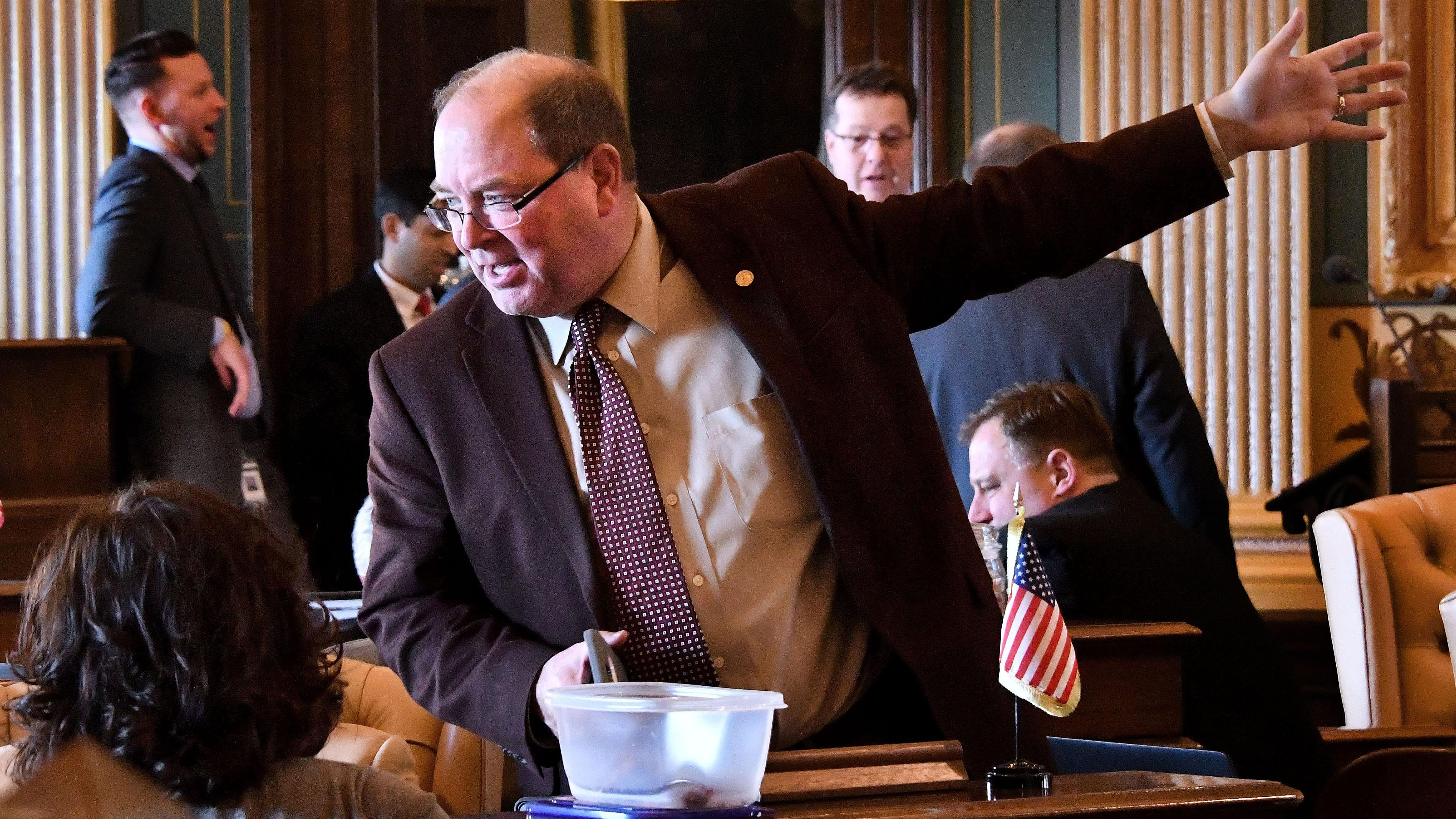Tax cut, fee forgiveness plans approved
 Jonathan Oosting
Jonathan OostingLansing — An average family of four would save $102 a year and the state would forgive driver responsibility fees owed by more than 300,000 residents under a compromise plan backed by Republican legislative leaders and headed to GOP Gov. Rick Snyder’s desk for signature.

Snyder had expressed budget concerns with earlier versions of the legislation but agreed to a deal Wednesday during a meeting with House Speaker Tom Leonard and Senate Majority Arlan Meekhof. The meeting paved the way for bipartisan approval and the easing of tensions heading into annual budget negotiations.
The final package does not include additional child care or senior tax credits previously approved by the House and Senate, respectively. But several of the bills approved Wednesday won unanimous support.
“I think when we listened to our taxpayers, they want improved schools, improved roads and they want money in their pocket. Today we delivered that,” said Meekhof, R-West Olive, telling reporters that legislators still plan to pursue increased budget funding for schools and roads proposed last week by Snyder.
The legislation would gradually increase the personal exemption that all Michigan taxpayers can claim to $4,900 by 2021, up the $4,300 expected with inflation under current law.
The state would also forgive outstanding driver responsibility fees and temporarily waive the $125 reinstatement fee for motorists who lost their license over failure to pay. Critics have called the driver fees an unfair double penalty because they are assessed on top of traditional traffic infractions.
“This is a fiscally responsible plan that benefits hardworking taxpayers all across the state,” Snyder said in a statement, adding that he welcomes the plan to eliminate the responsibility fees “while not creating new state debt.”
The responsibility fees would be forgiven by Oct. 1, and drivers could reinstate their license for free through the end of the year under a floor amendment proposed by Sen. Ken Horn, R-Frankenmuth, who said the provision will help “get Michiganders back on the road and back to work.”
About 317,000 drivers currently owe more than $630 million in outstanding driver responsibility fees. But because the state was not expected to collect many of the older debts, the amnesty plan is projected to cost $51 million over the next three years, according to the nonpartisan House Fiscal Agency.
Michigan created driver responsibility fees nearly 15 years ago under the stated goal of deterring irresponsible driving. Snyder agreed to phase out the fees in 2014, and that process will now be sped up.
“This was an unjust law,” said Leonard, R-DeWitt, who pushed for full forgiveness in negotiations with Snyder. “It was nothing more than a money grab to balance the budget. It was wrong for the people of our state. It was unjust for the people who currently have to pay.”

Leonard said he saw the impact of the fees first-hand when he served as an assistant prosecutor in Genesee County.
“I probably sat across from hundreds of people with tears in their eyes whose lives were in shambles because they could not legally obtain drivers licenses because they were burdened by these fees,” he said.
Sen. Coleman Young II, D-Detroit, said the deal means drivers in his district “will no longer have to fork over thousands of dollars to an administration looking to make a quick buck.
The proposals are expected to cost the state between $210 million and $220 million a year in revenue when fully implemented. Majority Republicans rejected an amendment to protect the School Aid Fund from any impact, but Meekhof said legislators plan to boost K-12 funding next year.
“I’m very confident in that,” he said.
Snyder had been reluctant to cut taxes too deeply but opened the door for lawmakers last month when he proposed a “fix” to the recent federal tax cut law, which he said inadvertently eliminated personal exemptions that taxpayers use to claim the state version. Without action, the administration warned the federal change could cost Michigan taxpayers a collective $1.5 billion a year.
Republicans quickly proposed larger increases and were joined by Democrats, who view the personal exemption as a more equitable form of tax relief than a proposed income tax rate cut.
In voting for the state plan, Democrats also blasted the federal tax reform legislation signed into law by President Donald Trump.
“We’re covering for a guy that spends more time tweeting than reading or leading,” said Rep. Sherry Gay-Dagnogo, D-Detroit. “I’m certain that this tax cleanup bill gives my colleagues on the other side of the aisle something they can hang their hats on after rallying around (Trump’s) egregious tax reforms.”
The tax and fee deal comes as Snyder and lawmakers begin negotiating the 2019 budget after the governor proposed his version last week. In a show of force last month, the Legislature voted to override a veto by Snyder on a plan to speed up a sales tax cuts for motorists who trade in old vehicles to buy new ones.
“I personally believe this is going to help the budget process go much smoother as we go forward,” Leonard said. “Certainly tax relief has been a top priority for us here in the House, and it’s been a priority in the Senate.”
The governor and lawmakers hope to complete the budget process by summer; the next fiscal year begins on Oct. 1. Snyder signed state budgets early in each of his first seven years in office.
While most legislators celebrated Wednesday’s tax and fee deal, the Michigan League for Public Policy warned that it could cause “drastic cuts” to vital services in future years.
“Lawmakers are making bad decisions today that will force future legislators to pay for them with significant cuts to the services residents value and rely on,” President & CEO Gilda Jacobs said in a statement.